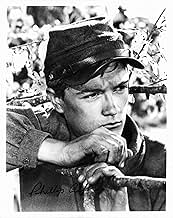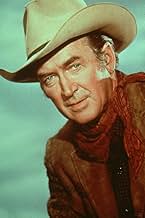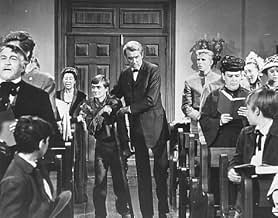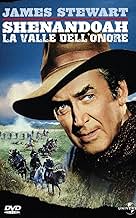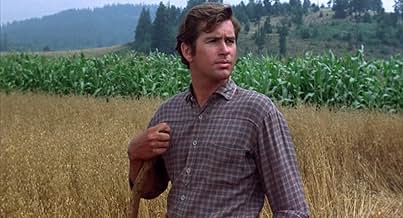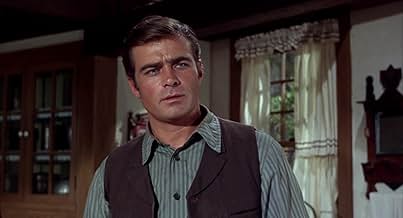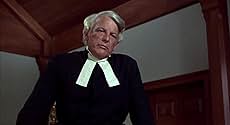Adicionar um enredo no seu idiomaA Virginia farmer who has vowed to remain neutral during the Civil War is spurred into action when his youngest son is taken by Union soldiers.A Virginia farmer who has vowed to remain neutral during the Civil War is spurred into action when his youngest son is taken by Union soldiers.A Virginia farmer who has vowed to remain neutral during the Civil War is spurred into action when his youngest son is taken by Union soldiers.
- Indicado a 1 Oscar
- 3 indicações no total
- John
- (as James McMullan)
- Gabriel
- (as Eugene Jackson Jr.)
Avaliações em destaque
In the fictional community of Shenandoah Gap(in the hills of Virginia),widowed patriarch Charlie Anderson(James Stewart)rules his clan of six sons and two daughters and is determined not to pay any attention to what is happening beyond the boundaries of their 500-acre farm. "This war is not mine and I take no note of it," he states without hestination or doubt. Anderson does not believe in slavery and has no thoughts on the preservation of the Union. He's more concerned with the raising of his children and the running of the farm. During the first part of the movie,it takes almost an hour to limit in the details of that world-the conflicts with neighbors and authorities,and the romance between daughter Jennie(Rosemary Forsyth) and Sam(Doug McClure of The Virginian TV series),a young Confederate officer. About half-way through,Anderson is forced to take action,and the pace of the film quickens. Well-timed coincidences keep things moving briskly,but the whole tone of the film takes on a sad quality as the family comes to understand how badly the war is going for Virginia. By far the best scene is an encounter between Anderson and Colonel Fairchild(George Kennedy),a Union officer whose warweariness seems absolutely authentic. In that moment,the film has the tough-mindedness associated with the James Stewart-Anthony Mann westerns of the 1950's. But McLaglen quickly reverts to the sentimental melodramatics and breathtaking action scenes that were always his strong suit. If the battle scenes(which are brilliant in detail)give some of the scope of other Civil War epics,then they are true to the individual combatants and greater more tactics as engagements. As such,they're believable,though in appearance and sensibility,the film has the standards characteristics of a western. Since the producers pitch this as a western picture in further perspectives.
At the time Shenandoah was made,the top three westerns of their day were at the top of the TV ratings:"Gunsmoke","The Virginian",and "Bonanza". It was the TV series "Bonanza",that was the top rated show on television and at the time was at the peak of its popularity. Any similarity between these two families is intentional since in character and story setting the TV series Bonanza was based in the regions of the Nevada Valley,while the motion picture Shenandoah was based during the height of the Civil War in the hills and valleys of Virginia. For the most part,McLaglen wisely keeps the camera on his star,and James Stewart carries the film and gives one of the most riveting performances of his career. While several of his younger supporting cast adopt unfortunate Southern accents,he sticks to the voice that everyone knows. That's a good thing,because Stewart is called upon to deliver many long,weighty and wise monologues since on a actual note was to be the most pontificatory role of his long established career. The speeches work because they're grounded in a believable sense of reality. The locations for shooting of the picture did not occur in the Southern regions of the United States,but in areas of Oregon that are similar to the Shenandoah Valley. Slavery was not as prevalent there as it was in other parts of the South;smaller farms were prevalent since the central crops were tobacco,corn,and cotton(in some areas)and not to mention a lot of chicken production and turkey farms(they grow a lot of turkeys down there). Finally,the film's refusal to take sides in the war serves as well. This was not only a sensational action-western flick,but one of those Hollywood tear-jerking melodramas that means to entertain while remaining fairly faithful to history. It does just that.
Shenandoah was one of the highest grossing movies of 1965,and was nominated an Academy Award for Best Sound. It was right up there with some of the biggest movies of that year.."In Harm's Way","The Sound Of Music","The Greatest Story Ever Told","Thunderball","Doctor Zhivago", and "The Sons Of Katie Elder".
The film is largely set on Stewart's farm in the Shenandoah Valley. At the start of the film, the family tries to go about its business as if the war did not exist. Ignoring the war becomes increasingly difficult, however, with soldiers constantly marching through the property trying to recruit the sons and requisition the livestock. When the youngest son is taken prisoner Stewart decides the time has come to take action, so they set out to find the boy. Along the way, lives are lost, values are tested, and mindsets are changed with experience.
Stewart's performance as the proud patriarch is excellent. It is a grizzled, more mature Jimmy Stewart than one is used to, with a cigar stub constantly dangling from his mouth and a perpetual scowl on his face, but in essence it is the same proud, upright character that he has always specialized in. He is effective in conveying the fear and vulnerability of a man who is unsure of the right thing to do, looking out for his family and land in the midst of a war-torn nation. His conversations at his wife's gravestone stand among the most poignant work of his career.
`Shenandoah' takes its time in telling its story, interspersing simple, low-key scenes (in church, at the dinner table) with action sequences. Its characters are real people with real problems, and with whom the audience can readily identify. It is a mature, beautifully realized film, with scenic photography and sensitive performances.
Having the youngest son rescued by an African American was also a daring move at the time.
Worth a look. It may not be historically accurate, but it touches on some important and timely, considering the nature of current events.
Charlie does not let his sons to join the army to fight in the American Civil War that he considers that it is not their war. Meanwhile Jennie marries to her beloved Lieutenant Sam (Doug McClure), but they do not have honeymoon since Sam has to go to the front. When Charlie's youngest son Boy is mistakenly taken prisoner by soldiers from the North. Charlie rides with his sons to rescue Boy, while James and Ann stays in the farm. But it is time of violence and war, and tragedy reaches the Anderson family.
The heartbreaking and unforgettable "Shenandoah" is one of my favorite westerns, with the story of a family caught by the American Civil War. The plot has elements of "Friendly Persuasion", with the strong code of honor of the patriarch of a family and James Stewart has another top- notch performance. My favorite scene is when Charlie prepares the room of an abandoned farm to give the opportunity of a honeymoon to Jeannie and Sam. My vote is eight.
Title (Brazil): "Shenandoah"
Note: On 09 Dec 2018 I saw this film again.
This movie is directed by Andrew V. McLaglen (The Wild Geese) and stars James Stewart (Vertigo), George Kennedy (Cool Hand Luke), Patrick Wayne (Big Jake), Rosemary Forsyth (Disclosure), Doug McClure (The Land that Time Forgot), Tim McIntire (Brubaker) and Katharine Ross (The Graduate).
The storyline, characters, setting and circumstances of the time period are very well established. The family dynamics is outstanding and James Stewart couldn't have been better cast. His script, demeanor and intensity was perfect. The chemistry within the entire cast was excellent.
The circumstances and perspectives of the Civil War were also well delivered; and the ending was a bit sad, but realistic and very well done.
Overall this isn't a perfect film but is very well executed and is definitely worth a viewing. I would score this movie a 7.5/10 and strongly recommend it.
Você sabia?
- CuriosidadesThe opening battle scenes are taken from A Árvore da Vida (1957) and are printed as a mirror image of the original footage. The same scenes can also be seen in, amongst other films, A Conquista do Oeste (1962).
- Erros de gravaçãoWhen Boy and Gabriel are found by the creek there is a young African-American soldier with the Union band. Then later Gabriel, a young African-American boy, is seen fighting along side Union troops. Free Blacks and former slaves did not integrate into Union regiments, but instead, served in all-Negro regiments.
- Citações
Charlie Anderson: Do you like her?
Lt. Sam: Well, I just said I...
Charlie Anderson: No, no. You just said you loved her. There's some difference between lovin' and likin'. When I married Jennie's mother, I-I didn't love her - I liked her... I liked her a lot. I liked Martha for at least three years after we were married and then one day it just dawned on me I loved her. I still do... still do. You see, Sam, when you love a woman without likin' her, the night can be long and cold, and contempt comes up with the sun.
- ConexõesEdited from ...E o Vento Levou (1939)
- Trilhas sonorasOh Shenandoah
(uncredited)
Traditional
Heard as theme twice during the film
Principais escolhas
Detalhes
Bilheteria
- Faturamento bruto nos EUA e Canadá
- US$ 17.268.889
- Tempo de duração
- 1 h 45 min(105 min)
- Cor
- Proporção
- 1.85 : 1


